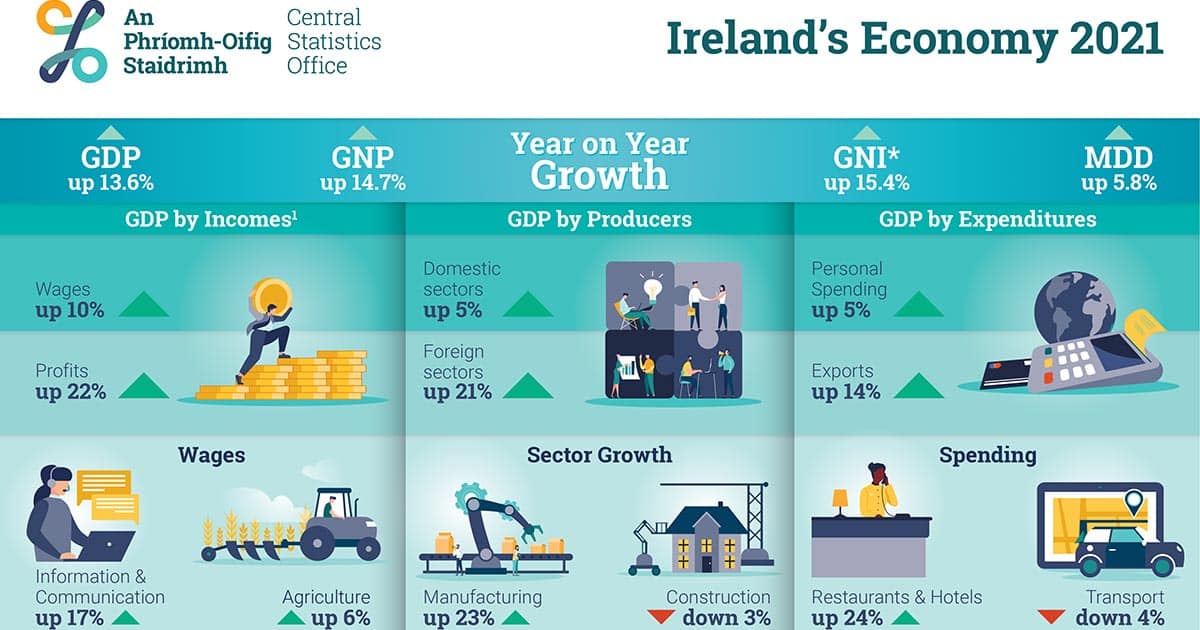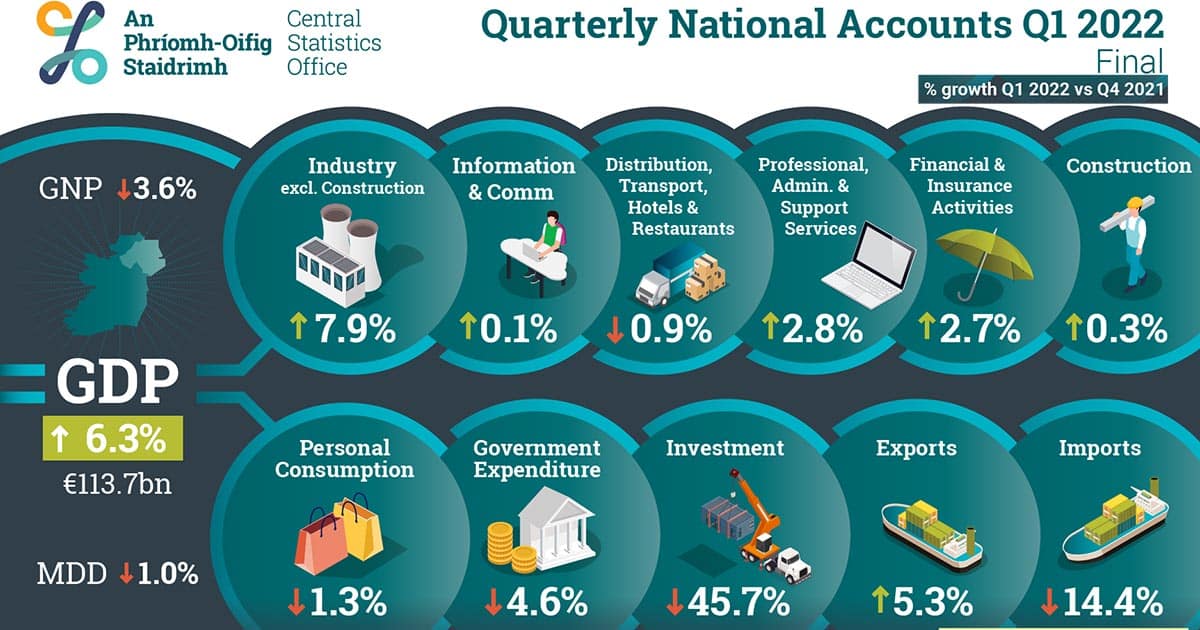Ireland’s Gross Domestic Product (GDP) grew by 13.6% in 2021 driven by strong upturn in multinational-dominated sectors, according to final 2021 National Accounts data from the Central Statistics Office.
GDP growth was driven by a 14.1% increase in exports of goods and services.
Gross National Product (GNP) - a measure of economic activity that excludes the profits of multinationals - grew by 14.7% in the year.
As expected, the easing of Covid restrictions led to higher levels of economic activity in 2021 for many of the sectors focused on the domestic market.
Finance & Insurance increased by 17.8% in the year, Real Estate activities by 6.6% while the Distribution, Transport, Hotels & Restaurants sector increased by 3.8%. However, the Construction sector contracted by 3.1%.
Multinational-dominated sector growth was 20.7% and in 2021 these sectors accounted for 53.0% of total value added in the economy, compared with a 49.5% share in 2020 and a 42.5% share in 2019.

In International Accounts results, the Current Account of the Balance of Payments recorded a surplus of €60.7bn in flows with the rest of the world in 2021, an improvement of €86.2bn compared with the deficit of €25.5bn in 2020, driven by higher merchandise and service exports and lower imports of Intellectual Property Products (IPP).
In comparison, the modified Current Account balance, which excludes the impact of re-domiciled companies, aircraft leasing companies and IPP, recorded a surplus of €26.0bn in the year.
Multinational profit net outflows were €87bn in the year, an increase of €14bn on 2020 levels.
Looking at expenditure in the economy, government spending on goods and services increased by 6.5% in 2021, while personal spending on goods and services (the PCE indicator) increased by 4.6% in the year
Jennifer Banim, the CSO’s assistant director general with responsibility for economic statistics, commented: “Examining PCE constant price levels over the past three years, personal spending of €104.5bn in 2021 was 6.8% lower than the €112.1bn pre-pandemic level of spending in 2019.
"PCE accounted for 24.7% of GDP in 2021, down from 26.8% of GDP in 2020 and 31.9% in 2019.”
Commenting on the impact of globalisation and the indicators of underlying domestic activity, Banim said: “Today’s results include estimates for GNI, the indicator designed to exclude globalisation effects that disproportionately impact Irish economic results.
"In the National Accounts, the transition in current prices from a GDP level of €426bn in 2021 to a GNI level of €234bn is shown. In constant prices, GNI expanded by 15.4% in the year.”
Modified Domestic Demand (MDD) – a modified measure of personal, government and investment spending – increased by 5.8% in 2021.
"MDD is an important measure of underlying demand and excludes the globalisation effects of trade in Intellectual Property Products and trade in aircraft by leasing companies," Banim explained.

Final National Accounts for Q1 2022 has also been published following preliminary data in June.
Gordon Cavanagh, statistician in the National Accounts division, noted that the update shows GDP growth of 6.3% in Q1 compared with Quarter 4 2021.
“Factor income outflows were €9.8bn higher than in the previous quarter, leading to an overall decline in GNP of 3.6% when compared with the previous quarter,” he added.
The continued easing of COVID-19 restrictions varied in impact across the sectors of the economy in Quarter 1 2022. In most sectors, growth continued with the globalised Industry sector (excl. Construction) growing by 7.9% in the quarter.
The Information & Communication sector was broadly unchanged compared with Q4 2021, increasing by a modest 0.1% quarter-on-quarter.
Sectors focused on the domestic market experienced mixed effects in the quarter, with the Finance & Insurance sector expanding by 2.7%, Construction increasing by 0.3%, and the Distribution, Transport, Hotels & Restaurants sector contracting by 0.9%.
Personal spending decreased by 1.3% in the quarter. Investment in capital formation decreased by 45.7%, explained by a fall in investment in IPP when compared to Q4 2021, according to Cavanagh.











